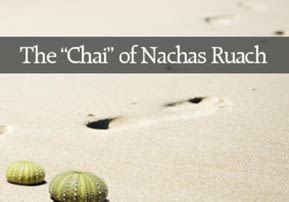
The “Chai” of Nachas Ruach
Nachas Ruach augments the 12-step approach with 6 additional spiritual concepts (12 + 6 = 18) in its Chai Program of recovery for Jewish participants…

“Nachas Ruach”: Jewish Spirituality and Psychotherapy, Part 3
I have learned to value the Twelve Steps as providing the basic and most effective holistic framework for understanding the principles that are necessary for long term recovery.
Dr Abraham J. Twerski, in his book titled: “Waking Up Just in Time” also shows that the 12 steps can be used to help people cope in a constructive way with any of life’s difficulties.
Working extensively with Jewish addicts over the years, I have seen the need and possibility to supplement the “official Twelve Steps” with six additional Torah concepts. The Twelve Steps are basically compatible with Judaism. Nonetheless, it is not possible to avoid the historical fact that the original program and the worldview which underlies it were developed by those whose faith was not Jewish. Over the years many have told me that they would like to work the program from a Jewish perspective. As a response to this need, the Nachas Ruach approach introduces six additional Jewish concepts in the Chai program (12 + 6 = 18 = chai) in a way that enhances the program for many Jewish participants.
 These are the six additional concepts that the Nachas Ruach approach has incorporated:
These are the six additional concepts that the Nachas Ruach approach has incorporated:
1. “Beloved is man, for he was created in the Divine image; it is indicative of a greater love that it was made known to him that he was created in G-d’s image”. (Pirkei Avos 3:18).
2. “Taste and see that God is good. Happy is the man who trusts in Him (Psalms 34:9).
3. “Rabban Gamliel used to say… Find yourself a Rav. (Pirkei Avos 1:16).
4. “And the study of Torah is equivalent to them all (Shabbos 127).
5. “You shall be Holy, for Holy am I, Hashem your God (Leviticus 19:2).
6. “Do not return to Egypt…” — relapse prevention (Deuteronomy 17:16).
The first concept that each person is created in the Divine image (Genesis 1:26) is the foundation of a Torah-based psychological understanding of man’s basic nature, and this should in turn be the basis for developing healthy and positive self-esteem. This applies to everyone, and is even more important for those in recovery.
We also learn in Pirkei Avos (3:18) in the name of Rabbi Akiva that man should be aware that he was created in the Divine image. Internalizing this self-awareness through meditation and hypnosis can help a person in recovery and anyone needing to improve their self-esteem to build their healthy adult identity by perceiving themselves the way Hashem positively views him, and this is an important part of healing traumas from the past that often underlie addiction and other symptoms.
The Torah obviously doesn’t deny one’s “issues” but sees them as external to his deepest inner self. Chassidus teaches that man’s essence is his unique Divine spark which is always healthy and holy. The Twelve Step program correctly requires someone in recovery to continue to say, “I am Joe Smith and I am an addict, clean for the past ten years.” This is necessary so the one in recovery won’t “fall back” into denial, which is usually the first step to relapse. The Chai group clearly recognizes this part of the program. However, it encourages the recovering addict to say as well, “I am Moshe Cohen, struggling with addiction and clean for the past ten years. I am also a Jew created in the Divine image.” When a Jewish addict says this, he is recognizing that he has intrinsic value, positive potentials, and the possibility to grow.
To recap, the Nachas Ruach formulation means that while one in recovery should never forget that addiction is like a disease,” he doesn’t have to and should not define himself only in terms of having the disease. He should also recognize and affirm that his unique Divine spark, which is his essential self, is always clean and from this place reach out to Hashem and say: “Create a pure heart for me Elokim, and a proper spirit renew within me…. the sacrifices Elokim requires are a broken spirit; a heart broken and humbled, Elokim You will not despise. (Psalm 51:12,19)
The second concept “Taste and see that God is good” (Psalms 34:9) was chosen because it concisely clarifies the Torah outlook on seeking pleasure, or the “pleasure principle” that Sigmund Freud defined to be man’s major motivation.
Contemporary society has in many ways become a “fun culture” or “culture of addictions,” strongly encouraging a lifestyle based on the pursuit of immediate gratification as an end in itself. It is ironic that the “pursuit of happiness” often leads so many people to end up with so much pain.
Therefore, it is clear to me that in this confusing era, the question is not whether but rather how to experience pleasure in a way that is positive, in a manner that can be integrated with serving Hashem.
The Ramchal was clearly relating to this issue when he stressed at the very beginning of Mesillas Yesharim, which is considered the greatest work on Jewish ethics or mussar: “man was created for the sole purpose of rejoicing in God and deriving pleasure from the splendor of His Presence; for this is the true joy and the greatest of pleasure that can be found.”
King David also expressed this idea in various Psalms, including:
“One thing I asked of Hashem, that shall I seek: Would that I dwell in the house of Hashem all the days of my life to experience the sweetness of Hashem and to contemplate in His sanctuary” (Psalms 27:4).
“But as for me, G-d’s nearness is my true good” (Psalm 73:28)
Serving Hashem with joy and passion was also one of the foundations of the teachings of the Baal Shem Tov, zt”l, and in later Chassidus, and is known was strongly emphasized by his great grandson Rebbe Nachman.
Dr Naftali Fish
nachatruach@walla.com
www.nachatruach.com
To be continued.
* * *
The above essay is an excerpt from Nachas Ruach, by Dr. Naftali Zvi Fish
Dr. Naftali Zvi Fish is a licensed clinical psychologist and hypnotherapist in Israel. After completing Doctorate in 1984 he made Aliyah from Philadelphia with his family, living in Jerusalem. During this time Dr. Fish has become a leading authority in the treatment of addictions, healing the “inner wounded child” and the enhancement of self-esteem which often underlies clinical issues. In the mid-nineties he founded and administered the first full-time Rehab program designed for Jewish addicts with the support of Rav Dr Abraham Twerski. Based on extensive experience Dr. Fish has developed and implemented the Nachas Ruach Treatment Model, a new and unique Paradigm to facilitate psycho-social and spiritual growth and healing. It utilizes and effectively integrates Torah perspectives and values, “openly bringing Hashem into the room,” within the context of professional Psychotherapy and Hypnotherapy. Dr. Fish has a full time private practice and has been teaching various courses in Psychology at Touro College – Israel since1993.












Tell us what you think!
Thank you for your comment!
It will be published after approval by the Editor.